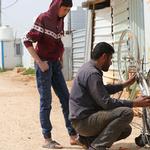Corona-prevention and Syrian Refugees in Jordan
<div class="event-icon"></div> <span>Save this event in my Outlook calendar</span>
<div class="event-icon"></div> <span>Save this event in my Google Calendar</span>
Jordan has enacted some of the world’s strongest lockdown and quarantine measures. These have been well-received domestically, but their impact on the country’s most vulnerable refugees is only beginning to be understood.
The majority of Syrian refugees in Jordan live in urban areas in addition to a significant number also residing in camps. As living conditions are linked to the effectiveness of prevention measures, different populations may experience different outcomes.
Sarah Tobin’s work explores transformations in religious and economic life, identity construction, and personal piety. She also examines the intersections with gender, Islamic authority and normative Islam, public ethics, and Islamic authenticity.
Ethnographically, her work has focused to a large degree on Islamic piety in the economy, especially Islamic Banking and Finance. Dr. Tobin also explore these questions in times of economic shifts, such as during Ramadan, in contested fields of consumption such as the hijab, and the Arab Spring.
Her latest research projects examine these questions with Syrian refugees in Jordanian camps of Za`atari, Azraq, and Cyber City, and in Results-Based Financing in Tanzania.
Project

